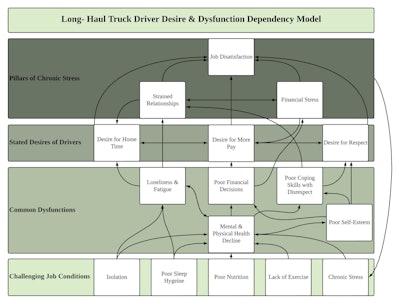While industry experts generally agree on the existence of a troublesome truck driver labor market, there is no consensus on what is causing the problem.
Many publications point to an overall truck driver labor shortage. Other experts, including MIT research scientist Dr. David Correll, cite pervasive inefficiencies such as dwell time and detention. While the debate on the existence of a driver shortage is complicated at best, the only way carriers can ensure their trucks will be full is to produce a net positive recruiting and retention program.
To accomplish this, it is vital to understand the root desires of truck drivers and the dysfunctions preventing those desires from being met. In a doctoral study conducted at Indiana Wesleyan University, those desires and dysfunctions were closely examined.
What is known about what truck drivers want?
Prior to conducting additional research, it was essential to lean on existing research to provide a firm knowledge foundation. The main takeaway from the review of previous studies was the existence of three broad domains of driver desire: pay, home time and respect. These domains were consistently represented in a number of industry surveys, including CCJ's What Drivers Want Survey. It may seem elementary to ask, but what causes the desire for more pay? Why do drivers crave more home time? What does respect mean to truck drivers, and why are they demanding more of it? The answers were quite astounding.
Novel research and findings: Dysfunctions uncovered
The research study involved interviewing 12 current and former long-haul truck drivers using an in-depth and semi-structured format with reliance on Socratic questioning. This format encouraged participants to explore the underlying thoughts and meanings of their initial responses and allowed the researcher to conduct more precise questioning. The interviews varied in length from one to almost two hours. Following the completion of all interviews, transcripts and audio recordings were thematically analyzed for common responses and sentiments.
Reviewing the analysis of the study through the lenses of the three desire domains of pay, home time and respect revealed some surprising findings.
Financial dysfunction
Not a single driver thought they were underpaid for the work they performed. In fact, the only common complaint about pay was in regard to pay not being based on tenure. Additionally, most drivers did not consider pay as a differentiator when deciding what company to drive for as long as the pay was competitive. Although the drivers interviewed described their pay as being fair, they commonly stated their desire for more pay was often a reaction to poor personal financial management. When probed further, many participants credited their poor financial situation to compulsive spending and commonly linked this spending to attempts to obtain social status or recognition from others. According to Hira and Mugenda, compulsive and excessive spending is commonly linked to feelings of low self-worth. Additionally, Harnish et al. identified compulsive spending and depression as common psychiatric comorbidities.Home time dysfunction
The discussions on home time were, frankly, heartbreaking. Perhaps the most astonishing finding related to home time was how drivers view their time at home versus how they actually utilize it. Nearly every participant declared their home time was valuable because the most important thing to them was to spend time with friends and family. When asked how long drivers would spend at home, a common answer was between three and five days. However, when asked how they spent those three to five days, drivers frequently described needing to spend 24 to 48 hours alone.
Drivers choosing to spend a considerable amount of their home time in isolation is perplexing, especially when they unanimously cited that spending time with family and friends is of the highest importance. When asked about this disparity, drivers described the need to recover from the conditions and stress of the job. Many participants further credited this need to recuperate from poor sleeping conditions caused by lackluster mattresses, noisy environments and irregular sleeping hours. In addition to this finding, drivers frequently described the constant tension between earning a living, which requires being out on the road, and going home. They illustrated this tension by describing the unaffordability of home time and the strain relationships are put under by not being physically present at home.
Respect dysfunction
The findings surrounding the desire for respect were also profound. Each driver had differing testimony on how often they encountered disrespect as a truck driver. Some drivers even reported not feeling disrespected at all. Many drivers stated they must respect themselves before being shown respect from others. However, in their own terms, nearly every participant described observing a lack of self-respect or self-esteem in other drivers or within themselves on a regular basis. The report of a lack of self-respect and self-esteem among truck drivers was triangulated with research found in the Journal of Behavioral Sciences, which describes a reported lack of self-esteem as an important predictor of depression. In addition, two-thirds of participants described their inability to deal with disrespect in a healthy fashion. Dr. Suma Chand describes this as a common issue among those who suffer from anxiety and depression.

Many of the dysfunctions resulting in job dissatisfaction discovered during the study were directly linked to the conditions of the job of a long-haul truck driver. Drivers described the negative conditions of the job as having difficult access to quality nutrition, lack of exercise, prolonged isolation and poor sleep. All of these conditions can be linked to causing or worsening depressive symptoms and negatively impacting physical health.
The dysfunctions stemming from poor physical and mental health include chronic loneliness, compulsive spending and poor coping skills when faced with disrespect. The stated desires of pay, home time, and respect seem to be a consequence of these dysfunctions. Moreover, the unfulfilled status of these desires results in strained relationships, job dissatisfaction and financial stress, which are the three pillars of chronic stress — a key contributor to poor mental and physical health decline. Below is an illustrative summary of the study.
Dr. Ethan Slaughter is the Chief Operating Officer at Christenson Transportation and recently completed an extensive qualitative study on the unfulfilled desires and causal dysfunctions of long-haul truck drivers resulting in poor retention in the trucking industry. In addition to this study, his ongoing research focuses on behavioral and labor economics and virtuous leadership theory.










